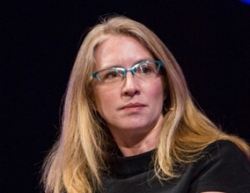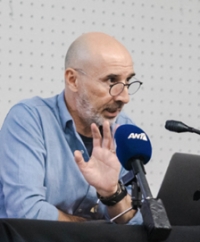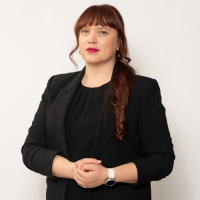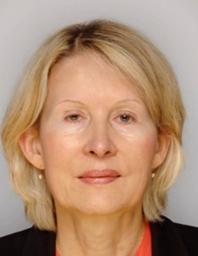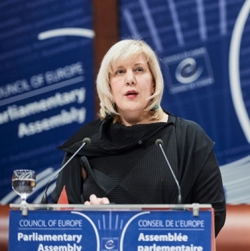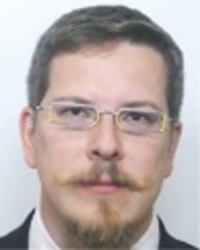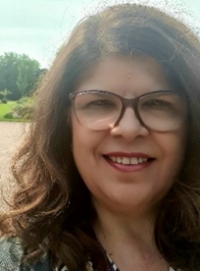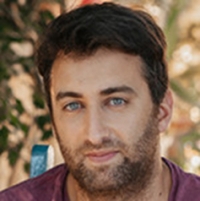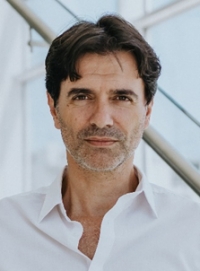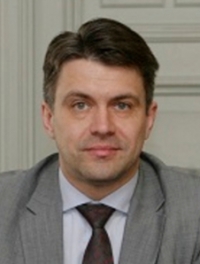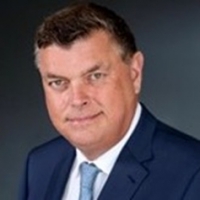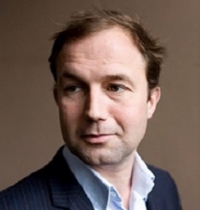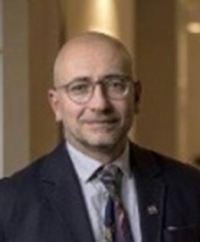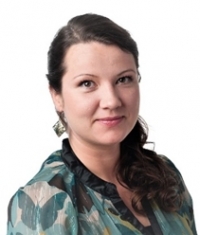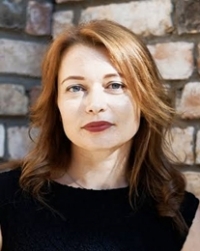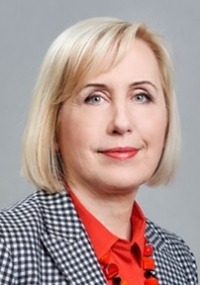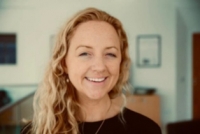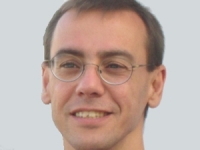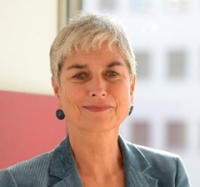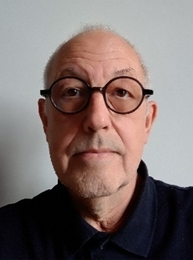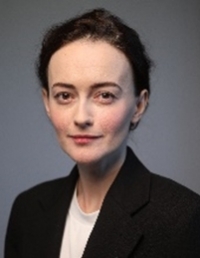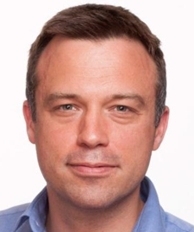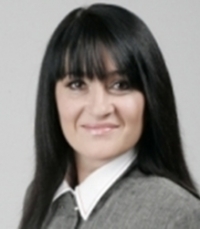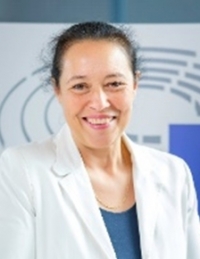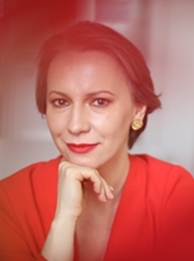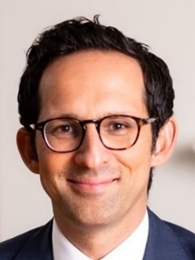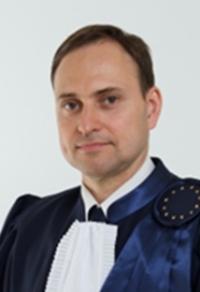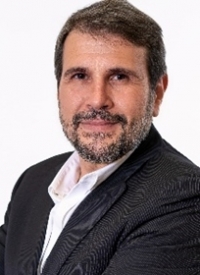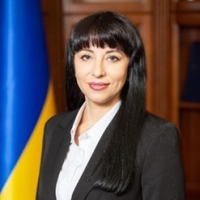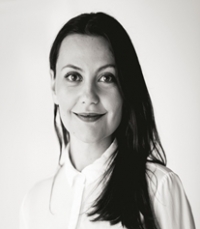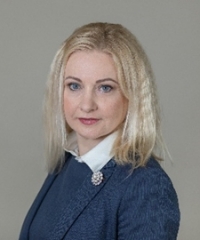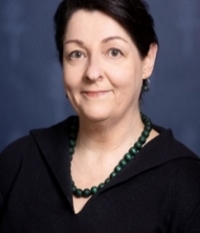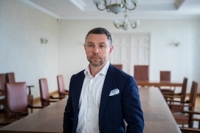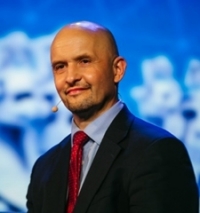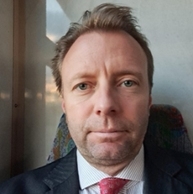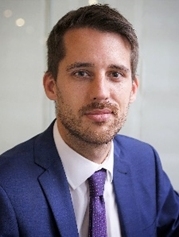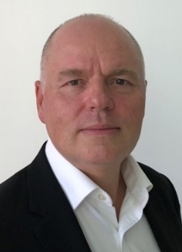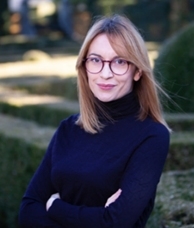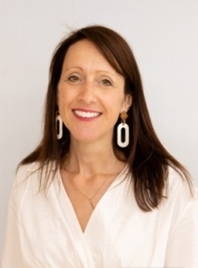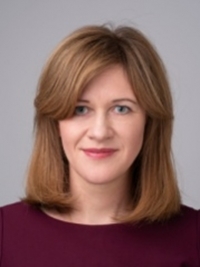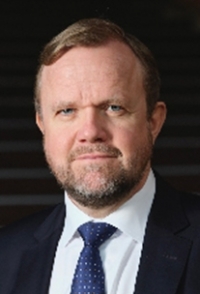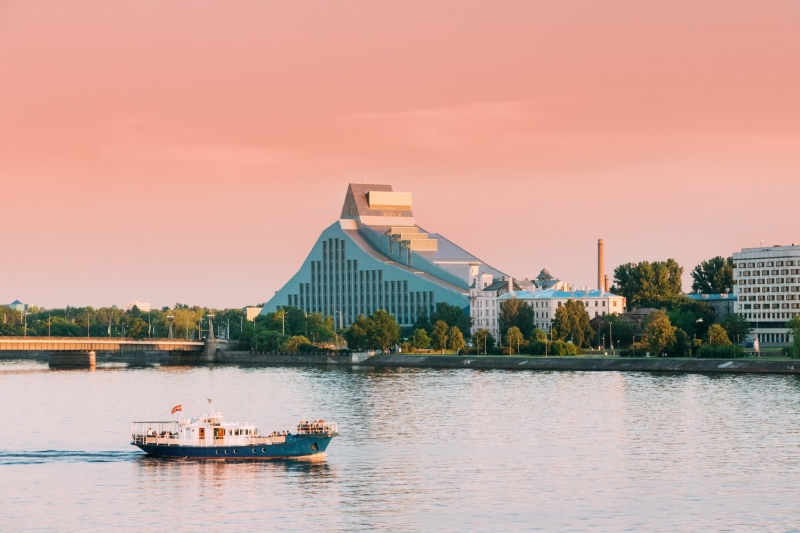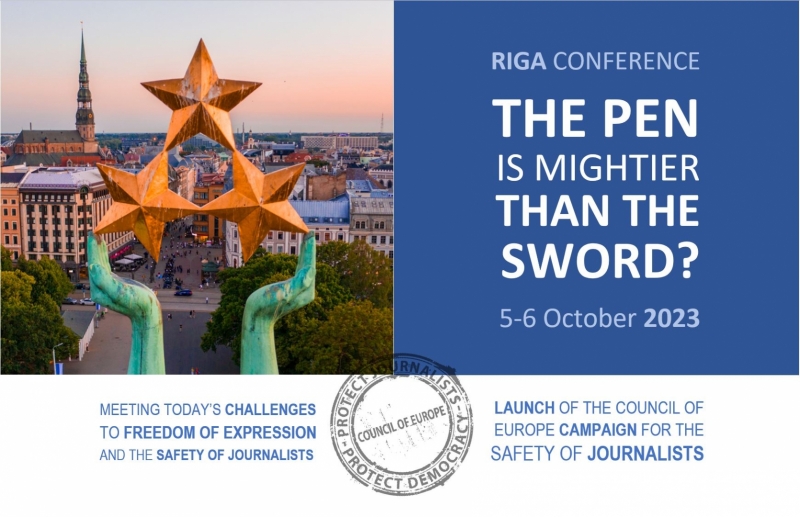
Published: 21.09.2023.
General Moderators
Ms Jodie Ginsberg is the President of the Committee to Protect Journalists (CPJ), a non-profit organization that supports journalists at risk by documenting threats and attacks on the media, providing advice and assistance, and conducting advocacy.
A journalist by profession, Ms Ginsberg joined CPJ in 2022 from media development organization Internews Europe, where she was the chief executive officer. She began her career at Reuters news agency where she held positions including Bureau Chief, London. In 2014, Ms Ginsberg was appointed chief executive of London-based freedom of expression group Index on Censorship, which she led until 2020. An internationally respected campaigner on issues of media freedom and freedom of expression, Ms Ginsberg is a regular speaker on journalist safety and issues involving access to information. She is one of the general moderator’s of the conference.
Mr Nicholas Karides, the general moderator of the conference, is the Director of the Institute for Mass Media, a non-profit research organization at the Universitas Foundation. He was born in Britain, went to school in Cyprus and studied at Pennsylvania State University, Middlesex Polytechnic and the London School of Journalism. After a spell as a journalist in London he served as Head of the Press Section at the European Commission delegation in Nicosia until Cyprus’ accession to the EU. He then set up Ampersand Public Affairs and was later among the founders and contributing editors of the online news outlet Offsite. He is the author of Knowing One’s Place a collection of essays on journalism, history and football and is a member of the team drafting the annual Media Pluralism Report on Cyprus for the European University Institute’s Centre for Media Pluralism and Media Freedom.
Opening remarks of the Conference
Minister of Culture of the Republic of Latvia, Agnese Logina, is an expert in culture policy. Before becoming a minister, Logina was the head of the Riga Film Museum, film curator, published writer on film and culture, and a councillor in the Riga City Council. She co-chaired the Riga City Council’s Culture Commission. Graduate of the Latvian Academy of Culture and Amsterdam University College, Logina guest-lectured on theory of culture at the Latvian Academy of Culture.
Ms Hanne Juncher, Director of Information Society and Action against Crime, Directorate General for Human Rights and Rule of Law, Council of Europe.
Before becoming Director of Information Society and Action Against Crime, Ms Juncher was the Executive Secretary of GRECO (the Council of Europe’s Group of States against Corruption) and in charge of the Council of Europe’s action against economic crime, including MONEYVAL and large-scale technical assistance programmes on economic crime. Before that she headed the Council of Europe’s work on justice and legal co-operation, including the European Commission for the Efficiency of Justice (CEPEJ), on private and public law, and on judicial reform. Prior to that she worked for the European Committee for the Prevention of Torture (CPT), represented the Council of Europe in the North Macedonia, and headed the Council of Europe’s human rights support and awareness-raising work. Ms Juncher joined the Council of Europe as a legal adviser in 1997. She also worked for the Ministries of Defence of Denmark and the United Kingdom. She has postgraduate degrees in law from Copenhagen and Essex Universities.
Ms Dunja Mijatović, Council of Europe Commissioner for Human Rights since April 2018.
As Commissioner, she has focused her thematic work on a range of human rights issues, including freedom of expression, safety of journalists, the protection of human rights defenders, the rights of migrants and refugees, and combating discrimination and hate speech. She has also worked to address the challenges faced by women, children, and vulnerable groups, particularly those affected by conflict and displacement, and on the human rights consequences of Russia’s war in Ukraine.
Prior to her appointment as Commissioner, she was the OSCE Representative on Freedom of the Media (2010-2017), Director of Broadcasting at the Communications Regulatory Agency of Bosnia and Herzegovina (2001-2010), Chair of the European Platform of Regulatory Agencies (2007-2010) and of the Council of Europe's Group of Experts on Freedom of Expression and Information in Times of Crisis (2005-2007).
Mr Taavo Lumiste, Chair of the Council of Europe Steering Committee on Media and Information Society.
He has 20 years of experience on multilateral policy making from different multilateral organisations, varying from NATO to the United Nations and different UN agencies in Geneva, amongst others the WHO (served as EURO regional coordinator 2015-16, represented the EURO region in the Member States’ WHO reform working group, and served as the Geneva-based deputy to the Estonian representative in the WHO High-Level Commission on Health Employment and Economic Growth), UNCTAD (as Group D coordinator led one of the four main Geneva-based negotiating groups for UNCTAD XIV Conference in 2016 tasked with negotiating the Nairobi Maafikiano outcome document; served as the Vice President of the UNCTAD Trade and Development Board during 2015-2019 for four rotations, chaired several Working Party meetings and co-chaired the first Intergovernmental group of experts meeting on e-commerce and digital economy), ILO etc., as well as WTO. Since 2013 he also serves as a member of the Social Council of the “Interesting School” initiative under the aegis of the Estonian Ministry of Education and Research. He has found his passion on global health, on youth and education innovation, as well as on the broader development policy agenda, wherein also his academic interests lie.
Ms Artemiza Chisca is teh Head of the Media and Internet Division and Secretary of the Steering Committee on Media and Information Society (CDMSI) of the Council of Europe. During her career of more than 20 years at the Council of Europe, Ms Chisca has worked in the framework of conventional and non-conventional monitoring mechanisms, notably on issues of local democracy and the protection of national minorities and, in recent years, for the Council of Europe’s European Commission for Democracy through Law (Venice Commission), on the promotion of democracy and fundamental freedoms. Ms Chisca is a graduate in law as well as in French language and literature and studied, among other places, at the Institute of Political Studies in Strasbourg and at the College of Europe in Bruges (master's degree in Community law). Before joining the Council of Europe, she worked at the Constitutional Court of Romania and at the University of Bucharest, Romania.
Mr Matthew Caruana Galizia is the son of Maltese journalist Daphne Caruana Galizia who was murdered in October 2017. He is a Pulitzer Prize-winning journalist and software engineer. He worked at the International Consortium of Investigative Journalists (ICIJ) for five years, where he founded the organisation’s Data and Research Unit in 2014 and was a lead engineer on six major investigations: Offshore Leaks, Swiss Leaks, Luxembourg Leaks, Fatal Extraction, Panama Papers, and Paradise Papers. The Unit’s core work on the Panama Papers, which supported the investigations of hundreds of journalists worldwide, led to ICIJ and Süddeutsche Zeitung winning the Pulitzer Prize for explanatory reporting in 2017. Mr Galizia left the ICIJ in 2018 to continue working on the case around the assassination of his mother, Daphne Caruana Galizia, who was an investigative journalist killed by a car bomb near her home in Malta in October 2017. Mr Galizia has been a tireless advocate for justice for his mother’s murder, leading efforts to galvanise the international community and hold the Maltese authorities to account despite the significant risk to his personal safety. He now runs the Daphne Caruana Galizia Foundation.
Herman Grech is an award-winning journalist and playwright. With a 26-year career in journalism, Herman currently serves as editor-in-chief of Times of Malta, the country’s biggest news organization.
He was among a handful of journalists who investigated Daphne Caruana Galizia’s murder, which led to the biggest protests of a generation. Herman went on to write and direct the play ‘They Blew Her Up’, which won the national award for best production of the year and toured around Europe.
A vocal advocate for human rights and media freedom, Herman is also a founding member of PEN Malta.
Mr Juris Jansons has been the Ombudsman of the Republic of Latvia since 2011 (re-elected in 2016 and 2021). He has previously worked as the Deputy State Secretary on Society Information and Electronic Government of the Ministry of Environmental Protection and Regional Development, Director of Legal Aid Administration of the Ministry of Justice, Head of Analytical Department of the Bank of Latvia, and a lecturer at the Faculty of Law of the Riga Stradiņš University.
Mr Jansons has obtained lawyer’s qualification (mag.iur.) and Master of Social Sciences in Economics (mag.oec.) at the University of Latvia and doctoral studies sociology at the Riga Stradiņš University.
In 2021 Mr Jansons was awarded with the Order of the Three Stars for meritorious service to Latvia in accordance with the decision of the President and the Chapter of Orders.
In 2017 the Ombudsman received the USA Nomination for Trafficking in Persons Report Hero Awards and the Certificate of Recognition from the International Romani Union for invaluable contribution to the development of Roma culture and history.
Mr Mogens Jensen, General Rapporteur on media freedom, PACE.
Current committees: Chairman of the Transport Committee, Vice-Chairman of Cultural Affairs Committee, Member of the Danish Delegation to the Parliamentary Assembly of the Council of Europe since 2007. The Defence Committee, The Finance Committee, The Foreign Policy Committee, The Greenland Committee, The Standing Orders Committee.
Former Minister for Food, Fisheries and Equal Opportunities and Minister for Nordic Cooperation, 27 June 2019 – 19 November 2020. Minister for Trade and Development Cooperation, 3 February 2014 – 28 June 2015.
Parliamentary career: Vice-Chairman of the Cultural Affairs Committee from 2020. Vice-Chairman of Legal Affairs Committee, 2015-2019. Auditor of public accounts, 26 October 2011-16 April 2013. Chairman of the parliamentary group of the Social Democratic Party, 2011-2012. Former chairman and vice-chairman of the Danish Delegation to the Parliamentary Assembly of the Council of Europe. Former Spokesman on Greenland, the Faroe Islands and the Nordic Council.
Mr Ton van der Brandt is Principal Adviser to the OSCE Representative on Freedom of the Media. He holds a degree in Dutch law and (cum laude) in International Law, and in Journalism. Mr Van den Brandt worked as a journalist for a national newspaper and a weekly magazine for many years, and is the published author of two journalistic books. Mr Van den Brandt worked as an ad interim legal adviser with the Netherlands Ministry of Foreign Affairs and with the Netherlands Red Cross, before taking up a position as a senior political adviser with Amnesty International.
Before moving to the OSCE, he led and managed the Communications Department of the Amsterdam District Court of Law. In his free time, he chaired the Dutch branch of the International Commission of Jurists and was a member of the Supervisory Board of the Netherlands Helsinki Committee.
Mr Ricardo Gutiérrez is General Secretary of the European Federation of Journalists (EFJ), the largest journalists’ organisation in Europe, representing over 320,000 journalists in 45 countries. Former journalist for the Belgian daily newspaper “Le Soir”, he is senior lecturer at Université Libre de Bruxelles (ULB). He is a member of the Belgian Press Council (CDJ) and of the Executive Committee of the European Trade Union Confederation (ETUC). He has conducted training for journalists on hate speech, ethical journalism and reporting on ethnicity and religion.
Moderator
Ms Karmen Turk (mag iur) is the acting Chair of the Council of Europe Committee of Experts on Strategic Lawsuits against Public Participation; lecturer, the University of Tartu, partner at the Law Firm TRINITI, Estonia.
She is a litigation attorney and partner at pan-baltic Triniti Law Firm with an expertise in artificial intelligence regulations, human rights and media law in Estonia and beyond (e.g. she has represented clients in European Court of Human Rights as well European Court of Justice). Ms Turk is a lecturer in the University of Tartu and has been an expert in the Council of Europe for several sub-committees (including Chair for Anti-SLAPP committee) and been involved in the European Commission and the Council of Europe joint projects in strengthening information society in countries such as Ukraine and Moldova, specifically in training judiciary - for example she was a trainer for human rights and media law for joint program of the European Union and the Council of Europe in Ukraine for development of human rights law course for the National Academy of Judges. In one sentence, she is passionate about all things connected to freedoms online and internet governance.
Key-note speech
Ms Inga Spriņģe is an award-winning investigative journalist, broadcaster, lecturer, and one of the two founders of The Baltic Center for Investigative Journalism Re:Baltica based in Latvia.
Ms Spriģe is a member of the major international investigative journalism networks ICIJ and OCCRP. Her topics cover propaganda, disinformation, and social justice.
Panelists
Ms Anda Rožukalne, Public Service Media Ombudsperson, is a professor and senior researcher at Faculty of Communication, Riga Stradiņš University (RSU) in Latvia. She is the first ever Latvian PSM Ombudsperson. Ms Rožukalne holds doctoral degree in media sociology and has extensive experience as journalist, editor, and scholar of journalism and media studies.
Her fields of expertise include a development of journalism values, media systems, media literacy, media regulation and self-regulation, and media audience studies. Since 2011, her research interests focus on building innovative audience and media research tools using artificial intelligence. Ms Rožukalne is the author of many educational and academic publications on journalism and media, she represents Latvia in the EC Media Pluralism Monitor (from 2015) and in the global Worlds of Journalism Study (from 2018).
Since 2008, Ms Rožukalne has been involved in the working groups for the development of Latvian media regulatory acts created by the State Chancellery and the Ministry of Culture of the Republic of Latvia. She is one of the establishers of the Association of Latvian Journalists and member of Academia Europaea, International Association for Media and Communication Research, European Communication Research and Education Association, Baltic Association for Media Research (BAMR).
Ms Sarah Clarke, Director, Article 19 Europe.
She joined ARTICLE 19 in January 2019 as Head of the Europe and Central Asia team, defending the human rights to freedom of expression and information in the region. Between 2012 and 2018, she led PEN International’s policy and advocacy work, overseeing its engagement with the UN and regional human rights mechanisms and governments. She has a particular interest in freedom of expression in Turkey, where she has led numerous advocacy missions, trial observations and the amicus interventions on the priority cases of journalists before the European Court of Human Rights. Ms Clarke has consulted for the UN High Commissioner for Human Rights, the UN High Commissioner for Refugees, the OSCE and the Oxford and Harvard Universities on issues relating to freedom of expression, asylum and forced migration. She speaks Spanish and is graduate of the Oxford University, Trinity College Dublin and BPP Law School.
Mr Carlos Perez Maestro works in the Unit "Audiovisual and Media Services Policy" in DG CONNECT of the European Commission. This unit develops policy and legislation in the field of audiovisual media services, with a particular focus on the application of Audiovisual Media Services Directive and on policies to strengthen media freedom and pluralism, including the Recommendation on Safety of Journalists. Carlos has spent most of his career in DG CONNECT, where he has been dealing with telecoms regulation, broadband deployment policies, consumer issues, universal service, net neutrality, and online disinformation.
Ms Nicola Frank is the Head of Institutional and International Relations, European Broadcasting Union (EBU), since March 2020.
From 2009 to 2020 she represented the EBU and Public Service Media at EU level, as Head of the EBU’s Policy office in Brussels. She joined the European Broadcasting Union in 1998.
She started her career in the European Commission in 1990 where she was responsible for an Information and Communication Programme towards the Mediterranean and the Near and Middle East. In 1996 she joined Media and Entertainment International, the international federation of media and entertainment trade unions, as Deputy General Secretary.
Ms Frank took an M.A. in Islamic Studies, Modern History and French Literature.
Moderator
Mr Andris Mellakauls, Head of Information Space Integration Division, Ministry of Culture, Latvia.
Having worked for Time-Warner in the UK for 15 years, in 1995 Andris moved to Latvia to be the Warner Music Europe consultant in the Baltic States. In 2001 he was elected by the Parliament to the National Broadcasting Council. Having served the maximum two terms, in 2009 he became adviser to the Minister of Culture on media policy until 2012 when he was asked to head the Ministry’s Information Space Integration Division. Mr Mellakauls is a former vice-chair of the EPRA and chair of the Council of Europe Steering Committee on Media and New Communications Services and its successor, the Steering Committee on Media and Information Society. During the Latvian presidency of the Council of the EU in 2015, he chaired the Audiovisual Working Party. He holds a master’s degree in Public International Law and Human Rights.
Key-note speech
Ms Olga Rudenko is the chief editor of the Kyiv Independent, an award-winning media start-up launched in November 2021 by the former editorial team of the Kyiv Post. Ms Rudenko is the former deputy chief editor of the Kyiv Post. She has written for global publications, and was a fellow at the Chicago Booth School of Business in 2021.
She was featured on the cover of Time magazine in May 2022 as one of the publication’s Next Generation Leaders, and won the Women of Europe award in the “Woman in Action” category in December 2022.
Panelists
Mr Tom Gibson, EU representative, Committee to Protect Journalists (CPJ).
He joined the Committee to Protect Journalists in January 2017 and is CPJ's lead advocate in Brussels covering the institutions of the European Union. He works to strengthen the EU’s positions on press freedom, domestically and internationally.
Between 2014 and 2016, Mr Gibson managed Protection International's Burundi and Congo desks, advocating for stronger state accountability for the protection of human rights defenders and journalists as well as developing emergency responses and protection measures. Previously, he worked in Amnesty International's Africa program from 2005 to 2014, based in London and Nairobi, during which he mainly researched human rights violations in the Great Lakes region of Africa.
Ms Olha Herasymiuk, Chairperson, Ukrainian National Council of Television and Radio Broadcasting.
Ms Herasymiuk is a well-known Ukrainian journalist, television program host, and television manager. Having graduated from the Faculty of Journalism at the Kyiv State University, she has worked for seventeen years in the print media. She did her internships in the United States (US News & World Report; Gannett News Service) and the Netherlands, and has worked as a freelance correspondent for the BBC for three years. In 1995, she started working in television, she was an author and host of a number of television projects and popular talk shows, and she was the General producer of well-known Ukrainian television and radio company “1+1”.
Ms Herasymiuk also holds a master's degree in foreign policy and has been actively involved in the work of the Ukrainian Parliament as a member of the Committee on Free Expression and Information and the Committee on European Integration as well. She was Deputy Head of Permanent Delegation of the Verkhovna Rada of Ukraine to the Parliamentary Assembly of the Council of Europe. Ms Herasymiuk is a member of the Council of Europe Steering Committee on Media and Information Society. Since 2014, the year of the beginning of Russian aggression against Ukraine, Ms Herasymiuk has become a member of the National Council of Television and Radio Broadcasting of Ukraine, and in 2020 she became the Chair of this Authority. After entering into force of the Law of Ukraine "On Media", which implemented the provisions of the Audiovisual Media Services Directive, the media regulator headed by her, currently is a crucial state body on reforming and the implementation of European integration processes in the media sphere.
Ms Isabel Wiseler-Lima, MEP (PPE), Rapporteur for the report on the protection of journalists around the world and the European Union’s policy on the matter.
She is an elected member in the European Parliament from Luxembourg. She sits within the EPP Group. Ms Wiseler-Lima is the EPP Coordinator for the Subcommittee on Human Rights, she is a full member of the Foreign Affairs Committee and the Delegation to the EU-Turkey JPC. She is also a substitute member of the Committee on Civil Liberties, Justice and Home Affairs, the Committee on Industry, Research and Energy, the Committee on Civil Liberties, Justice and Home Affairs, the Delegation for relations with China and the Special Committee on Foreign Interference in all democratic processes in the EU, including disinformation. She is rapporteur of the European Parliament report on the protection of journalists around the world and the EU’s policy in the matter which was adopted during the plenary session on 11 July 2023. During this legislative term, she was also twice rapporteur, respectively in 2018 and 2022, for the annual report on the situation of human rights and democracy in the world and the EU’s policy on the matter.
Ms Sabīne Sīle is the Co-founder and Director of Sustainability Foundation in Latvia, overseeing Media Hub Riga that manages support to local, as well as over 250 media workers in exile. She is also a member of the Advisory Council on Media Policy at the Ministry of Culture in Latvia, board member of the International Civic Forum and an Advisory Board member of the Fix Media Foundation. Previously, the Director at the Centre for Media Studies at the Stockholm School of Economics in Riga, the co-founder of the Social entrepreneurship association in Latvia and the first charity shop foundation chain in Latvia- Otra elpa. After starting off her professional work in a consulting firm, she transitioned to venture philanthropy field - managing Partners in Ideas Foundation and continuing with development work in the fields of education, social/professional integration and corporate social responsibility. Ms Sīle’s children and her cross-cultural experience from her studies in Hong Kong and USA, have been formative to her life, work and worldview.
Moderator
Mr Can Yeğinsu, Barrister, Deputy Chair of the High-Level Panel of Legal Experts on Media Freedom.
He is a barrister practising from 3 Verulam Buildings in London, where he is recognised as one of the U.K.’s leading lawyers practising in civil liberties and human rights, administrative and public law, and public international law.
Mr Yeginsu has appeared in numerous cases as counsel representing journalists, as well as free speech and media organisations, before a range of courts and tribunals, including the U.K. Supreme Court, the Inter-American Court of Human Rights, and the ECOWAS Court of Justice. He is currently international Counsel to Nobel Laureate, Maria Ressa, and lead Counsel to the Wikimedia Foundation and Radio Free Europe / Radio Liberty in cases before the European Court of Human Rights. In 2019, Mr Yeginsu was appointed to the High Level Panel of Legal Experts on Media Freedom, the independent advisory body to the Media Freedom Coalition of States. In 2021, he succeeded Amal Clooney as the High Level Panel’s Deputy Chair, alongside Catherine Amirfar.
Mr Yeginsu is Lecturer-in-Law at Columbia Law School (New York), where he co-teaches a seminar on freedom of expression and is a Fellow at the Law School’s International Claims and Reparations Project which is currently advising the Government of Ukraine. He is also a Visiting Professor at Georgetown Law (Washington D.C.) and Koç University Law School (Istanbul), where he teaches international law.
Key-note speech
Mr Mārtiņš Mits, Judge of the European Court of Human Rights.
Since 2015 Mr Mits is a Judge of the European Court of Human Rights elected in respect to the Republic of Latvia. He holds Dr.iur. (LL.D) degree in International Law from Lund University (2010) and LL.M degree in Human Rights obtained at University of Nottingham (1998). Over 25 years before being elected as a judge he has been a law academic with a particular interest in the European Human Rights Law. He was a Prorector of Riga Graduate School of Law (until 2015) and an Associate Professor (until 2019). He has published widely on various law and policy issues, being an author of more than 50 publications.
His other professional engagements included being a Member of the Constitutional Rights Committee of the President of the Republic of Latvia (2007-2013), representing Latvia as an Alternate member in the Management Board of the European Union Agency for Fundamental Rights (2007-2012), being listed as an ad hoc judge to the European Court of Human Rights (2012-2015), and acting as an Expert of the Latvian Council of Science (most recent: 2015-2018).
Panelists
Mr Carlos Aguilar Paredes, Vice-President ERGA 2023, board member, National Authority for Competition and Markets (CNMC), Spain.
Ms Yuliia Derkachenko, Representative of the Ukrainian Parliament Commissioner for Human Rights.
Ms Derkachenko was engaged in scientific activities for 22 years as a lecturer at the Donbass Institute of Technology and Management of CJSC «International Scientific and Technical University». She also worked as a Head of the Department of the History of Ukraine and Legal Disciplines Department of the Donbas Institute of Technology and Management of the Higher Education Institution «Academician Yury Bugai International Scientific and Technical University». In 2022, Ms Derkachenko started working at the Secretariat of the Ukrainian Parliament Commissioner for Human Rights as a Director of the Personal Data Protection Department. Later that year, she was appointed to the position of Representative of the Commissioner for Information Rights of the Secretariat of the Ukrainian Parliament Commissioner for Human Rights.
Ms Eliška Pírková works as a Europe Senior Policy Analyst and the Global freedom of expression lead at European Access Now, the international civil society organization that defends and extends digital rights of online users at risk. As a member of the European Access Now team, she leads the work on content governance issues, including the EU Digital Services Act package among others. She is a human rights lawyer by education and training, with previous experience working for international organizations and as a legal researcher. She is a member of the Council of Europe’s Committee of Experts on Combating Hate Speech, nominated by the Council of Europe as an independent expert.
Ms Kristīne Pakārkle is legal advisor in the Ombudsman’s Office of Latvia. Her main working experience in civil and political rights sphere is on freedom of expression, gender equality and private life including protection of personal data. During her career in the Ombudsman’s Office she has focused on such issues like balancing the freedom of expression with the right to private life, online hate speech and different aspects of General Data Protection Regulation.
The topics she is most interested in are the borders of the freedom of speech and expression in democratic society. Kristīne Pakārkle has participated in several discussions and conferences. She likes to explain different aspects of freedom of expression and private life to media as informing the society is one of the tasks of the Ombudsman’s Office.
Ms Tuija Saresma, PhD, is senior lecturer at the Research Centre for Contemporary Culture, University of Jyväskylä, Finland. She holds Titles of Docent in Cultural Studies and Gender Studies at the universities of Jyväskylä, Helsinki, and Eastern Finland. She has published widely on hate speech and online hate and harassment. Her recent publications include peer-reviewed articles and academic book chapters on hate speech, affective communities on the internet, right-wing populism, gendered violence online, as well as two reports on hate speech by the Finnish Government’s analysis, assessment and research activities. Ms Saresma takes actively part in societal discussion, gives talks and writes popular texts for broad audiences, including several invited blog posts for NGOs and organizations. Ms Saresma is a former chairperson and currently a board member of the Association for Gender Studies in Finland and the Association for Cultural Studies in Finland, and the treasurer of the international Association of Cultural Studies (ACS). Ms Saresma was granted the Academic of the Year 2022 Prize by the Finnish Union of University Researchers and Teachers.
Moderator
Mr Viktors Makarovs, Special Envoy on Digital Issues at the Ministry of Foreign Affairs of Latvia, Vice Chair of the former Council of Europe Committee of Experts on Freedom of Expression and Digital Technologies.
Mr Makarovs is the first envoy on Digital Affairs to be appointed at the Ministry of Foreign Affairs of Latvia. Before assuming his current post in October 2021, he focused on international outreach to counter disinformation, resilience building and media support. Mr Makarovs holds a degree in Political Science from the University of Copenhagen and acquired a background in the Latvian NGO think-tanking community before joining the Ministry in 2011.
Key-note speech
Mr Jānis Sārts, Director of the NATO Strategic Communications Centre of Excellence.
Since 2015, Mr Sārts is heading the NATO Strategic Communications Centre of Excellence based in Riga, Latvia. Mr Sārts is a recognised expert in strategic communications and emerging technologies, and a demanded speaker on the subjects of disinformation, social media impact and national security aspects of emerging technologies. Mr Sārts has a profound background in defence sector dating back to 1994. Prior his present post, Mr Sārts has been the State Secretary of the Ministry of Defence of Latvia for a bit more than seven years. He has also led the Latvian Government’s efforts to increase its security and defence capabilities in cyberspace. As the Chair of the National Cyber Security Board, Mr Sārts was responsible for formulating and overseeing the implementation of Latvia’s cyber security policy, as well as for overseeing the work of the National Information Technology Security Incident Response Institution – CERT.LV.
Panelists
Mr Elmārs Sveķis is Head of Radio Free Europe/Radio Liberty (RFE/RL) Office in Riga. Previously he was the Head of Political, Press and Public Affairs at the UK Embassy Riga. Prior to this, he served as a technical advisor for the Democracy Programme of UNDP Moldova as well as worked extensively in Albania and Kosovo delivering technical assistance projects with the OSCE and private sector.
Mr Sveķis represents RFE/RL in Latvia and oversees the work of the Riga operation. RFE/RL’s Riga office opened in 2023 as a hub for various RFE/RL services including Current Time, Russian Service, Russian language investigative reporting unit Systema and Votvot.
Mr Andrin Eichin, Senior policy advisor, Federal Office of Communications (OFCOM), Switzerland, Chair of the Council of Europe Committee of Experts on the Integrity of Online Information.
Mr Eichin works as senior policy advisor on online platforms and digital policy at the Swiss Federal Office of Communications (OFCOM). He is currently the Chair of the Council of Europe’s Committee of Experts on the Integrity of Online Information (MSI-DIG).
As an expert on the intersection of platform regulation and freedom of speech, he works in policy development on national level and represents Switzerland in various international fora. Mr Eichin contributed to the development of Switzerland’s National Action Plan for the safety of media professionals, which was published in May 2023 (available here). In the implementation of the National Action Plan, he is responsible for the measures on SLAPPs and the impact of online platforms on the safety of journalists.
Mr Eichin is also part of the OFCOM’s core policy team that developed the Swiss Government’s recent report on impacts of platforms on public communication (report published in November 2021, available here) and which is developing Switzerland’s new legislation for the regulation of online platforms.
Mr Andrew Moger, Chief Executive, News Media Coalition.
Mr Moger is a career journalist and an international advocate for media freedom. In heading the News Media Coalition (NMC), he represents major publishers and news agencies in safeguarding professional eye-witness journalism in the context of big, organised news events.
He has written for numerous publications as an in-the-field reporter before taking on executive positions and then the role of founder and Chief Executive of the NMC.
His focus is on ensuring that a strong news sector can continue to best serve citizens with trustworthy reports, news photography and video journalism in the face of constraints on how news across the range of topics is gathered, published and distributed. Mr Moger believes that at a time of growing uncertainty about authenticity of information, news journalists and newsroom operations need to be valued and supported by society.
Ms Iva Nenadic, Research Fellow at the European University Institute – Centre for Media Pluralism and Media Freedom; European Digital Media Observatory.
Ms Nenadic is an academic researcher and expert specializing in media policy and regulation, especially focusing on growing digital challenges and transformations affecting journalism and information sphere. She is Assistant Professor at the Faculty of Political Science in Zagreb and Research Fellow at the European University Institute, affiliated with the Centre for Media Pluralism and Media Freedom (CMPF). She is part of the core team for the Media Pluralism Monitor project. Ms Nenadic is also one of coordinators in the European Digital Media Observatory (EDMO), where she chairs an expert group on structural indicators for the EU Code of Practice on Disinformation and conducts research and analysis of relevant policies in this area. Iva holds a PhD in Communication Science. Prior to her academic career, she worked as a journalist and editor for a decade and received several awards for her work.
Ms Mélanie Lepoultier, France (L, ILDG), Council of Europe Congress Rapporteur on local and regional media and Mayor of Sommervieu.
Ms Lepoultier, Mayor of Sommervieu and Vice-President of the department of Calvados (France), is Rapporteur on local and regional media for the Congress of Local and Regional Authorities of the Council of Europe. At its session in October 2023, the Congress will consider her report “Local and regional media: watchdogs of democracy, guardians of community cohesion”, which outlines the crucial role of subnational media in upholding democracy, the challenges they are facing and how to address them. Ms Lepoultier is particularly passionate about protecting freedom of expression and has been actively contributing for several years to the management of the annual Bayeux Calvados Normandy Prize for War Correspondents, which addresses issues of press freedom and the safety of journalists, particularly in the conflict areas.
Dr. Zanda Kalniņa-Lukaševica is a Latvian politician and since November 1, 2022 serves as a Deputy Speaker of the Saeima, Parliament of the Republic of Latvia.
Deputy Speaker is an active member of the Committee of the Foreign Affairs and the Committee of European Affairs, and holds the position of Head of the Latvian delegation to the Parliamentary Assembly of the Council of Europe.
Dr. Kalniņa-Lukaševica served as a Parliamentary Secretary of the Ministry of Foreign Affairs of Latvia from 2014 – 2022. Between 2017 and 2022, Dr. Kalniņa-Lukaševica chaired the Consultative Board for Development Cooperation Policy of Latvia.
In 2011, Dr. Kalniņa-Lukaševica was elected to the Parliament of Latvia and served as the Chairperson of the European Affairs Committee (2011-2014).
It should be noted that Dr. Kalniņa-Lukaševica also played an active part in the accession process to the OECD, and therefore in 2016 received an award from the Cabinet of Ministers. Between 2008 – 2011, Dr. Kalniņa-Lukaševica served as a Deputy Chairperson of the Strategic Analysis Commission of the President of Latvia and as an Adviser on Strategic Planning and Analysis to the President of Latvia.
Dr. Kalniņa-Lukaševica holds a Doctoral degree (PhD) in Management Science with a focus on public administration from the University of Latvia.
Additionally, aside from her political duties, she engages in active civic duties, such as, being a member of the board of a non-profit organization ‘’European Movement – Latvia’’, and a member of the board of trustees of the Brussels based think tank ‘’Friends of Europe'’. Dr. Kalniņa-Lukaševica is a member of the European council of Foreign Relations (ECFR). Furthermore, she is a lecturer at the University of Latvia and teaches a course on Foreign Affairs of the European Union.
Mr Bjørn Berge, Deputy Secretary General, Council of Europe.
Mr Bjørn Berge serves as the Council of Europe’s Deputy Secretary General since 1 March 2021.
As the Deputy Secretary General he is involved in a number of key areas of the work of the Organisation, including advising and overseeing the implementation of the Secretary General’s reform agenda, in line with the decisions and priorities of the Committee of Ministers.
His priorities include shaping the Programme and Budget, while ensuring that the Organisation’s activities have maximum impact in advancing democracy, human rights and the rule of law. He also oversees the Council of Europe’s staff policy, as well as other key areas of the work of the Organisation.
Before taking up his post, Mr Berge was for a period of four years Director General and Secretary to the Committee of Ministers of the Council of Europe.
Between 2009-2017, he served as Director of the Private Office of the Secretary General and the Deputy Secretary General, helping to prepare, co-ordinate and implement a number of comprehensive reforms of the Organisation.
Mr Berge has over thirty years of international professional experience.
As a former Norwegian diplomat, he served as International Adviser to the Prime Minister and as Deputy Director of the Foreign Minister’s Cabinet responsible for all matters related to Parliament. He also served as speechwriter to three Norwegian Foreign Ministers.
Mr Berge has published several books on a range of issues relating to speech writing and speeches, as well as articles on the Council of Europe’s mandate and work.
He was a Fulbright Scholar and holds a M.A. in International Relations from the Paul Nitze School of Advanced International Studies (SAIS), Johns Hopkins University, Washington D.C., USA.




